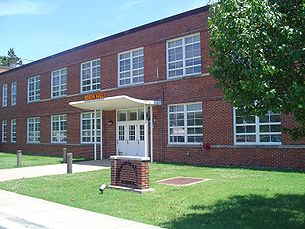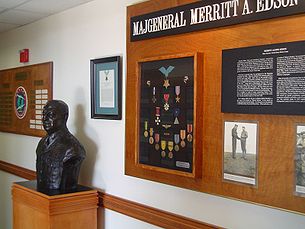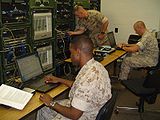.gif)
Communications School (United States Marine Corps)
Encyclopedia


Mission statement
To provide professional and technical training in the planning, designing, engineering, employment and operation of tactical communications systems in order to ensure commanders at all levels within the Marine Corps have the ability to exercise the command and control functions throughout the operational environment.History of Communications School
The Communication Officers School was formerly established during the height of World War II on 1 June 1944, under the leadership of Lieutenant Colonel C. Nelson. At that time, a 20-week Communications Officer Course, which provided instruction on the newest communications techniques, procedures, and equipment, was designed to help standardize communications planning and employment throughout the Marine Corps based on lessons learned acquired through nearly three years of war. The first class, which was the forerunner to the Advanced Communications Officer Course, graduated on 18 October 1944. Eight years later, a Reserve Communications Officer Indoctrination Course was added to provide instruction to the Fleet Marine ForceFleet Marine Force
The United States Fleet Marine Forces are combined general and special purpose forces within the United States Department of the Navy that are designed in engaging offensive amphibious or expeditionary warfare and defensive maritime employment...
s Reserve.
On 2 February 1954, ground was broken for a new, $300,000 building on the edge of the Potomac in Quantico. After a year-and-a-half of construction, the building was dedicated on 12 December 1955 and named “Edson Hall” in honor of Major General Merritt A. Edson
Merritt A. Edson
Major General Merritt Austin Edson , known as "Red Mike", was a general in the United States Marine Corps. Among the decorations he received was the Medal of Honor, two Navy Crosses, the Silver Star, and two Legions of Merit...
, a World War II Marine hero and leader of the famed “Edson’s Raiders”
Marine Raiders
The Marine Raiders were elite units established by the United States Marine Corps during World War II to conduct amphibious light infantry warfare, particularly in landing in rubber boats and operating behind the lines...
and a vocal proponent of the criticality of communications in combat.
The first Communication Officers Orientation Course was convened on 25 April 1955. The four-week course was designed to give recent Basic School graduates a background in communications prior to reporting to the Fleet Marine Forces. That course, over the years, has evolved into the current Basic Communications Officer Course (BCOC), a 19-week course designed to provide initial communications skills training to company grade officers and enabling them to execute the responsibilities of a Battalion/Squadron S-6 Officer. The course stresses hands-on equipment training combined with realistic field exercises.
In 1973, the school’s advanced course lengthened to 41 weeks and additional emphasis was placed on amphibious command and control techniques. Later, in 1989, this course was changed again to the Command and Control Systems Course (CCSC) to better address technological advances in command and control systems used by commanders on today’s modern battlefield. In 2002, with the establishment of the Expeditionary Warfare School—which combined elements of both Marine Corps career-level PME curricula (the Amphibious Warfare School and CCSC)—Communications School refocused its advanced instruction through the addition of the eight-week C4 Planners Course (C4PC), designed primarily for captains and master sergeants.
In 1998, two new courses were added to the school's mission: a two-week Advanced Communications Seminar (ACS, formerly known as ACIS) to help prepare field grade 0602 officers and their Communication Chiefs for their respective duties at senior commands; and a two-week Communications Officer Refresher (COR, formerly known as CISOR) Course to provide communications refresher training and education for company grade officers. Both courses support the Total Force of active and reserve officers.
Communications School continues to provide quality instruction at both the basic and advanced levels to selected Marine Corps communications officers and chiefs, as well as officers from other services and nations. Many graduates of this school have achieved success in a wide variety of endeavors, including U.S. Senator John Warner
John Warner
John William Warner, KBE is an American Republican politician who served as Secretary of the Navy from 1972 to 1974 and as a five-term United States Senator from Virginia from January 2, 1979, to January 3, 2009...
(R-Va.) and General Alfred M. Gray (ret), 29th Commandant of the Marine Corps.
Organization
Communications School is led by a Director and divided into five sections:- Basic Instructor Group is responsible for the Basic Communications Officer Course
- Advance Instructor Group is responsible for the Advanced Communications Officer Course, Warrant Officer Communications Course, and Advanced Communications Seminar (a two-week class for field grade and senior enlisted marines).
- Enlisted Instructor Platoon (EIP) provides marines and equipment in support of schoolhouse requirements.
- Academics Section is responsible for the course development, instructional delivery, and evaluation efforts for all of courses taught at Communications School.
- Operations Section satisfies all administrative and operational requirements of the Commanding Officer, both Instructor Groups, Academics, EIP, and all enrolled students.
Courses

Basic Communications Officer Course
Led by the Basic Instruction Group, the Basic Communications Officer Course (BCOC) (formerly known as Communications and Information Systems Officer Course (CISOC)) is Communications School's largest course and longest course. Currently conducted twice per year, BCOC is a 20-week program of instruction that provides leadership and professional training in the planning and employment of tactical communications systems in order to prepare company grade officers for entry-level billets in the Operating Forces. The majority of the students commence BCOC following their graduation from The Basic School, and are awarded with the 0602 MOS upon successful completion of the course. Class sizes typically range from 70-90 students, and the core curriculum areas include communications theory, single channel radio, tactical telephone switching systems, tactical data networks (including CompTIA Security+ training and certification), tactical multi-channel radio systems, and communications planning.Advanced Communications Officer Course
Led by the Advanced Instruction Group, Advanced Communications Officer Course (ACOC) is a 10-week course which provides formal skill progression-training in technical planning to captains and majors serving in the operating forces, and other select planners. Communications marines and sister-service communications officers attending the Expeditionary Warfare School attend ACOC as part of their Occupational Field Enhancement Curriculum.The mission is to provide instruction on planning for the employment of common user network and subscriber terminal equipment within a Marine Air Ground Task Force as a component of a Joint Task Force (JTF) with external connectivity to Unified Combatant Commands and national level systems. This is accomplished through a curriculum built on the following modules of instruction: Planning, Communications Control, Communications Security, Information Security, Radio Network Plan, Multiplex Network Plan, Data Network Plan, Video Teleconferencing Plan, and Organizational Messaging Plan that are applied in the content of the Communications Plan (Annex K) to an Operation Order/Plan. Practical application exercises and quizzes are used throughout the curriculum; the student’s final evaluation is to write a major subordinate command (MSC) level Annex K based upon a Marine Expeditionary Force
Marine Expeditionary Force
A Marine Expeditionary Force or MEF is the largest type of a Marine Air-Ground Task Force...
level operation order.
Communications School conducts ACOC semi-annually, and sizes range from 15 (Fall) to 40 (Spring) students. Funded class seats are available via HQMC for 0602 captains and majors. All nominees must participate in the seven core modules of instruction. Marine officers receive the secondary MOS of 0603 upon successful completion of the course.
Warrant Officer Communications Course
Communications School conducts three simultaneous, 6-week Warrant Officer Communications Courses for W01 MOS 0610, 0620, 0650 students following their graduation from The Basic School. Also led by the Advance Instruction Group, these warrant officer courses are focused on technical planning training and education in each functional area. Thirty class seats are available on a first come first serve basis to C4 (MOS 0610, 0620, 0650) Warrant Officers (WO1-CWO5) serving in the operational forces, reserve component, and supporting establishment.Advanced Communications Seminar
The Advanced Communications Seminar (ACS) is a Total Force formal training program for senior officers (CWO2 through CWO5 and Capt through Col) with the MOS 0602. The mission of ACS is to provide current and necessary information to optimize the effectiveness of officers in G-6/J-6 billets at the Marine Expeditionary Force (MEF), Component, Theater, or supporting establishment level. This is accomplished through presentations on joint operational and strategic communications, Marine Corps C4 planning/management and information technology updates. ACS is two-weeks in length and conducted annually in the spring with a maximum capacity of 50 students.See also
- Marine Corps Communication Electronics SchoolMarine Corps Communication Electronics SchoolMarine Corps Communication-Electronics School is the Marine Corps training ground for the majority of the communications and ground electronic maintenance Military Occupational Specialties .-Mission statement:...
- United States Marine Corps Training and Education Command (TECOM)United States Marine Corps Training and Education CommandThe Marine Corps Training and Education Command is the primary training command of the United States Marine CorpsIt develops, coordinate, resource, execute, and evaluate training and education concepts, policies, plans, and programs for Marines to meet the challenges of operational...
- The Basic School

